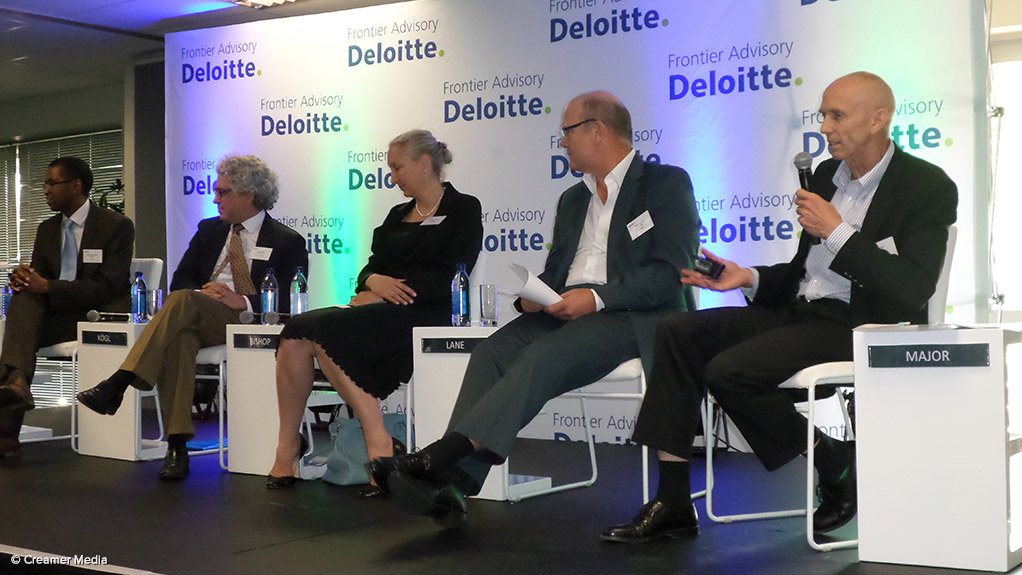African economies need to adjust focus as China shifts from resource-intensive growth model


EXCHANGING VIEWS Lesego Mosupye, Jürgen Kögel, Annabel Bishop, Andrew Lane and Peter Major
Africa’s growth in the past was, arguably, propelled by artificially high commodity prices, driven by Chinese demand for natural resources.
However, as China rebalances its economy away from the resource- intensive growth model propelled by heavy infrastructure spending and manufacturing, commodity- driven economies, particularly those in sub-Saharan Africa, must refocus their economies as well, said research and investment advisory firm Frontier Advisory Deloitte MD Dr Martyn Davies.
He was speaking as the moderator of a panel session at the company’s fourth yearly Africa Risk and Investment Forum, in Johannesburg, last month.
The panellists were specialist bank and asset manager Investec group chief economist Annabel Bishop, financial services group Cadiz Corporate Solutions mining and resources divisional head Peter Major, State-owned export credit loans and investments underwriter Export Credit Insurance Corporation of South Africa chief risk officer Lesego Mosupye, strategic consultancy Tractus Consulting director Jürgen Kögel and advisory firm Deloitte Africa energy and resources industry leader Andrew Lane.
Bishop was of the view that the natural resources market had come off the supercycle and was currently at “a more normal commodity price range”.
Concurring with Davies’ analysis, she said China’s rebalancing of its economy towards the services sectors would have significant implications for African economies.
“This will enable China to have stable growth levels, which are not heavily impacted on by commodity price spikes and declines, as has been the case in recent years,” Bishop explained.
She commented that China’s rebalancing would not “occur overnight” and would take a number of years.
“I do not anticipate that we are going to move back into a commodity supercycle any time soon. We are looking at a situation where commodity prices may rise slightly, as the global economy returns to trend, which could be as late as 2019,” Bishop stated.
However, she said from that perspective, Africa would have adjusted to the “new normal” of lower commodity prices.
Bishop pointed out that the past supercycle resulted in overinvestment in the mineral resources sector, which enticed many African countries into becoming overly reliant on commodities to promote economic growth.
“South Africa is fortunate in that it has a very large and vibrant services sector, particularly financial services, which is yielding the fastest economic growth rate in our economy of about 3.4%, compared with the overall economy, which contracted during the second quarter of 2015.”
Nonetheless, she noted that the adjustment to more modest commodity prices had been difficult for South Africa and even more so for other African countries.
Bishop highlighted that a number of countries, particularly oil exporting ones, such as Nigeria, Gabon and Angola, had their government finances halved as a result of the major fall in oil prices over the past year. These countries had also experienced significant dwindling of their current accounts, with some even falling into a deficit, she added.
“Overall, many African countries’ economies require a structural readjustment and this could be quite hard owing to the current social, political and economic challenges that these countries are facing.
“However, in the favour of many African countries is the demographic dividend of having many young people, who, if enabled to enter the formal job market, could stimulate economic growth,” Bishop asserted.
Major highlighted that South Africa’s gold production volumes had decreased significantly over the past 60 years. He noted that the sector produced 600 t/y of gold at its peak but that this had declined significantly to the current volumes of about 150 t/y of gold.
Major noted that, despite gold trading at double its average price, production levels continued to decline while they should be increasing owing to its high value.
“However, in reality, gold mines in the country continued to close and I predict that there will not be a gold mine left in South Africa in the next 4 years,” he warned.
Major said that, for several decades, R10-billion a year in revenue was generated by the local gold industry but, currently, the country only created about R6-billion from the sector.
“This can be attributed in part to South Africa diversifying into other commodities but production volumes are declining in other commodities as well,” he noted.
However, Major pointed out that, in the past five years, while gold production volumes were declining in South Africa, the Democratic Republic of Congo (DRC) and Zambia had increased copper output, with both countries currently producing over one-million tons of copper a year.
“I hope that South Africa’s politicians will learn from the examples of the DRC and Zambia, particularly in term of how they attracted large sums of foreign direct investment, to ensure they can save our gold sector,” he stated.
Comments
Press Office
Announcements
What's On
Subscribe to improve your user experience...
Option 1 (equivalent of R125 a month):
Receive a weekly copy of Creamer Media's Engineering News & Mining Weekly magazine
(print copy for those in South Africa and e-magazine for those outside of South Africa)
Receive daily email newsletters
Access to full search results
Access archive of magazine back copies
Access to Projects in Progress
Access to ONE Research Report of your choice in PDF format
Option 2 (equivalent of R375 a month):
All benefits from Option 1
PLUS
Access to Creamer Media's Research Channel Africa for ALL Research Reports, in PDF format, on various industrial and mining sectors
including Electricity; Water; Energy Transition; Hydrogen; Roads, Rail and Ports; Coal; Gold; Platinum; Battery Metals; etc.
Already a subscriber?
Forgotten your password?
Receive weekly copy of Creamer Media's Engineering News & Mining Weekly magazine (print copy for those in South Africa and e-magazine for those outside of South Africa)
➕
Recieve daily email newsletters
➕
Access to full search results
➕
Access archive of magazine back copies
➕
Access to Projects in Progress
➕
Access to ONE Research Report of your choice in PDF format
RESEARCH CHANNEL AFRICA
R4500 (equivalent of R375 a month)
SUBSCRIBEAll benefits from Option 1
➕
Access to Creamer Media's Research Channel Africa for ALL Research Reports on various industrial and mining sectors, in PDF format, including on:
Electricity
➕
Water
➕
Energy Transition
➕
Hydrogen
➕
Roads, Rail and Ports
➕
Coal
➕
Gold
➕
Platinum
➕
Battery Metals
➕
etc.
Receive all benefits from Option 1 or Option 2 delivered to numerous people at your company
➕
Multiple User names and Passwords for simultaneous log-ins
➕
Intranet integration access to all in your organisation



















